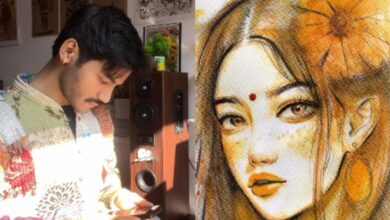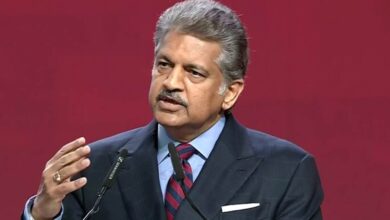Shanker Raman interview: Love Hostel director talks about Bob Deol’s ‘force of nature’ hitman, ‘trying to keep people alive’ during Covid shoot

Writer-director Shanker Raman, whose latest film Love Hostel was released recently on ZEE5, spoke about how each of his three leads — Vikrant Massey, Sanya Malhotra and Bob Deol — approached their characters. Co-produced Shah Rukh Khan’s Red Chillies Entertainment, Love Hostel is a stylish, blood-soaked crime thriller that defies definitions. It’s a dark fable about modern India, but it feels like it’s telling a story as old as time itself — about an inter-faith couple on the run from an ideologically-driven hitman.
In an interview with the Indian Express, Raman spoke about crafting a unique ‘visual grammar’ for the film, trying to keep people alive as they shot during the second wave of the coronavirus pandemic, and comeback star Bob Deol’s childlike enthusiasm for learning Haryanvi. He also spoke about the video of a real-life couple that inspired the shocking opening scene in the film, and described the hitman Dagar as an unstoppable ‘force of nature’.
Excerpts from the conversation, mildly edited for brevity and clarity.
There was a lot of chatter when your first film, Gurgaon, came out, how easy or difficult was it to make this one?
Gurgaon was made with a certain intentionality. I come from an independent film background, although people tell me I shouldn’t say that (laughs)… So, I learned a lot during that process, and when it came to Gurgaon, the intention was to make a film that is commercial. And not to use it as a reductive word, but to make it more accessible to a larger audience. I spent a lot of time trying to understand what is it that helps appeal to a larger audience without feeling like I’m compromising. I went through that journey. And when Gurgaon was completed, it turned out the way it turned out. And the final product, I would say, was something we arrived at, rather than, I can’t say for sure that this is something where we wanted to arrive at.
When it was complete, we were very happy with what it was. It was pretty close to the original vision… This was my biggest learning from Gurgaon; one of the most important things for me was collaboration with the producer. My ideas are what they are, they need nurturing, they need championing.
One can’t say Gurgaon made even a dent at the box office (laughs). The popularity went up after the OTT release. It happened over time, it wasn’t an instant success. So, one of the challenges for me, for my next film, was the subject. Like I said, I come from an independent film background, and sometimes, my ideas may not be the ‘hero model’. They’re stories about the world, stories about people, stories about how people deal with daily exence… After Gurgaon, I did Leila, I did a bunch of episodes for that. The show was all set up, but I wasn’t a part of the core creation of that project, it was something I collaborated on…
Bob Deol plays Dagar in Love Hostel.
You’re serving someone else’s vision, essentially, right?
Serving someone else’s vision, aligning with it, dealing with the challenges of executing it… But it was a lot of fun, it was great working with Netflix. I was always thinking about what to do next. And when I met Raghav (Gupta, producer) and he proposed to me that we should work together, we started working on a bunch of ideas. We tried to adapt a book, we looked at other scripts that were coming in, but nothing was really landing. And one day, I called him up and asked if he had anything else. And he shared this idea of Love Hostel with me. He had this semi-written screenplay, loosely based on this documentary about safe homes. And he talked to me about this character Dagar, who’s this mercenary hitman, who is a… I don’t know how to describe him, he’s a force of nature. To call him evil or good is redundant, it’s like saying an earthquake is evil (laughs). He’s unstoppable. Not because he’s immortal, but because he can only be stopped nature itself. And I really liked that idea. It was set in Haryana, and I come from the north; it was a comfort zone for me. So, in some ways, it was easy to adapt to this idea, because I come from that milieu. It just clicked. I could tell a story about a world that operates on its own rules and you can’t question those rules. If you question those rules, you don’t have a place in that world. That was the middle ground for me, where you’re talking about the world, but you’re trying to mount it in a commercial space, with a character arc and a villain. I wouldn’t say it was easy, but it’s something I could latch on to easily.
Because of the tough subject matter, the movie isn’t to everybody’s taste. Especially, on a very basic note, the endings of both these movies. It feels like something you wouldn’t be allowed to do, like something that is pushing the boundaries of what you can do in mainstream films. Did someone ever come up to you and suggest that you should pull back?
No, actually.
That’s so cool.
One of the disciplines of writing this story was to strip the world completely from any inflections. I said I’m not interested in establishing this world. It’s a bit like life… I wanted to tell a story where you begin with ‘This is the world’. I wasn’t interested in why the world is like this. Just like I cannot give an explanation for why life is the way it is. Reality doesn’t make any sense, so when you fictionalise something, it has to have a logical emotion. I wasn’t interested in what prompts them, what drives them, not really. So it became an interesting exercise in writing a sequence of events.
So I started with the opening scene, where he strings this girl up. That’s what I’d written in the first draft. This couple, who are they? Why do they matter? They’re nobody. They’re regular people, like you and me, who decided to take charge of their lives. You have to put a face on them, but you don’t have time to invest in them. I’d seen a video online, of this real couple who had run away, and she was speaking to who I presume was her father. It was really emotional for me to see that. It’s out in public domain, that video. At best, it’s a cry for help. I don’t know if they’re okay, if they’re not okay. They’re nobodies. I don’t know how to find them, even if I wanted to. But their lives mattered to me. The fact that they want and desire something mattered to me. That’s when the opening scene of Love Hostel came up, that we should put a face to them. They should kick-start this film.
They represent more than what they are.
That’s right. So, your hero characters are representative of them. One of the things I struggle with a lot is if I’m doing justice to the milieu. As a writer, am I working with my own prejudices? Even if I’m not prejudiced as a person, I can’t help but acknowledge whatever imprints my upbringing has had on me. It’s true for all of us, and we struggle with it everyday. And I didn’t want it creeping into the writing. Even the so-called evil ones. They’ve all had troubled lives. They’ve all had some trauma that has boxed them into a certain place. Like Kamala Dilawar’s character, the politician. She’s a woman who might have been married into a traditional family, and she may have dealt with whatever comes with it, and she may have decided one day that she wants to become a person of power. She may have thought that… But the moment she takes power, she, like every human being, becomes insecure about holding onto it. And her unaddressed trauma surfaces. That’s the predicament. And I feel that’s a place of deep suffering. I just kept that in mind while writing these characters, including Dagar.
For me, both these movies are dark fables. It feels like these characters are almost archetypes. I wanted to ask you about how you work on set, especially with regard to how you work with actors. Often, in India, you hear actors say that they won’t do more than one or two takes, which is odd. Are you someone who likes getting things done quickly, or do you keep working at it until you get what you want?
I would love to be a director who gets the job done quickly, because who wouldn’t (laughs)! But it doesn’t work like that. It’s also the level of prep, but ultimately, no matter how well-prepped I am, I’m a human being. There are so many things going on in my life other than this film that I’m doing. God only knows what pressure I’m under on that day. For me, the most important thing is to make them (actors) feel safe. Because only when they’re feeling safe, they can express. A human being, typically, is designed to not express how they feel. That’s how we become adults (laughs). We don’t talk about our feelings, we talk about what we think about what we feel, rather than what we feel. Therefore, we are full of interpretations…
Actors are also human beings, and they don’t have any technology to hide behind. So they need to feel safe. That takes some amount of work. Secondly, every take is an interpretation the actor. And beyond a point, you can’t tell an actor what to do. All you can do is just nudge them. I’ll talk about all the three main actors in Love Hostel.
Shanker Raman poses with stars Vikrant Massey and Sanya Malhotra. (Photo: ZEE5)
Bob has nothing in common with Haryana and Haryanvi. When he read the lines for the first time, I had to explain them. He was a bit nervous about speaking that language, and we’d talked about adapting it to traditional Hindi. But Bob was invested in not just his part but the film. It took us a while to get him to say yes, which was good. It meant we had to up our game to respond to his queries that came up after the first narration. But what I was really attracted to was his passion for storytelling. This particular story. He started working on it a month prior to shoot. There was a time when we would have dinner on location, and he would just say his lines to me, like a child, happy to have learned them. He was great, he completely surrendered to me. He would do one or two takes, I’d make slight adjustments, we’d do one or two more, and we’d be done. With Bob, there was a lot of action, and he’s very good at it. Even with dialogues, he was spot-on pretty much, with a few adjustments. His characterisation allowed that. He’s clinical in his approach. There’s no transactional exchange happening with his character. With Vikrant, it was different, because he has a double life.
He is struggling to be the person who he truly is. And you can clearly see how the environment is working against him. So in that sense, there were greater complexities to playing Ashu. And Vikrant took to it. But he’s also more free-flowing. He likes to build the part. So, sometimes, it would take some extra takes to get to the sweet-spot.
With Sanya, she was well-prepared. She’s also unassuming. She would come and just do it. And it would be perfect. There were a couple of scenes where she may have interpreted it differently from what I had thought of, and then we would get into a discussion and she would ask for 10 minutes to recalibrate. And she would take that time, and she’d be fine. Every actor has a process. But I like actors to be well-prepped with their lines. And these three were just spot-on.
The film also has a particular visual grammar. So it takes a while to choreograph it, and to get a precision of movement and character action. So, that would sometimes take some time. It’s not a traditional mid-shot, close-up, long-shot scenario. We shot with one camera. I think there was just one scene where we had multiple cameras, and that also we used very sparingly. Sometimes what happens, and understandably so, is that we use multiple cameras in the interest of saving time, but then it affects the visual grammar.
Using one is indicative of a clarity of vision…
And there is some authorship to it. The authorship was there in the writing. Once the film was greenlit… It was sometime in April 2020 that I narrated the film to Shah Rukh. But we couldn’t go on floors because of the lockdown, so subsequently I wrote another 10-12 drafts! It wasn’t like I was writing extra scenes. I was just re-writing the same scenes to make them more precise, so that my work gets easier on location. And all that work paid off, because we were in the middle of the second wave when we shot it. You see, when Covid hits us, all bets are off. Forget visual grammar, you’re just trying to keep people alive (laughs). All that prep helped. This film cannot be seen in isolation in terms of its craft, because we went through serious times in terms of Covid, and the unaccounted-for costs that happen. And we’re all people, right? Sometimes we don’t know how to solve a problem. But we pulled through!






